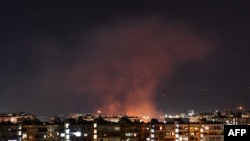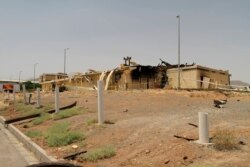Syrian state media reports say Israel carried out airstrikes in Syria near Damascus Monday for the first time in several weeks, targeting Iranian-linked sites and killing at least five Iranian-backed fighters. Israel has not confirmed it was behind the airstrikes, which come after a series of explosions in Iran itself over the past few weeks. While Israel may not have been responsible for all of the attacks in Iran – some observers in Israel argue Iran could strike Israel as a way of diverting attention from sanctions and the COVID-19 pandemic.
The Syrian Observatory for Human Rights, a monitoring group in Britain, said there were several explosions around the town of Kisweh, a town that has long been associated with Iran’s Islamic Revolutionary Guards. The airstrikes hit weapons depots and military positions belonging to Iran-backed militia fighters.
The Syrian news agency blamed Israel, saying the missiles were fired from the Golan Heights. Israel did not confirm it was behind the attack. Israeli forces have carried out hundreds of similar attacks in the past.
The strikes also raise tensions between Israel and Iran - already running high. A series of fires and explosions over the past ten days in Iran has also contributed. Most notably was an explosion in the Natanz area at a plant where centrifuges were manufactured that analysts in Israel said would delay Iran’s nuclear program by at least a year.
The New York Times newspaper quotes an unidentified senior Israeli official, widely believed to be the head of the Israeli Mossad, that Israel was responsible.
Former senior U.S. official John Bolton told Israel’s Army Radio Tuesday he supports these attacks on Iran.
“I don’t claim to have any special knowledge about how these events happened, but they seem clearly aimed at both the Iranian nuclear weapons program and its ballistic missile program. Whoever is doing it they have my complete support. It may be dissidents inside Iran, it may be working with outsiders, it may be a combination, but, look, even despite the economic pressure that has been put on Iran since the U.S. withdrew from the nuclear deal there’s obviously still a lot more to do and I think this is exactly what we need,” he said.
But some Israeli analysts say that Israel should be careful about antagonizing Iran. Iran is faltering under a serious economic crisis and international sanctions, as well as the Covid-19 pandemic. Iranian leaders are still angry about the U.S.’ targeted killing of Revolutionary Guards leader Qassem Soleimani in January.
The Iranian currency, the rial, has lost half of its value in recent months.
Analysts say Iran might launch a direct attack, or more likely, use its proxy Hezbollah to launch an attack on Israel to divert attention from Iran’s difficult situation.


